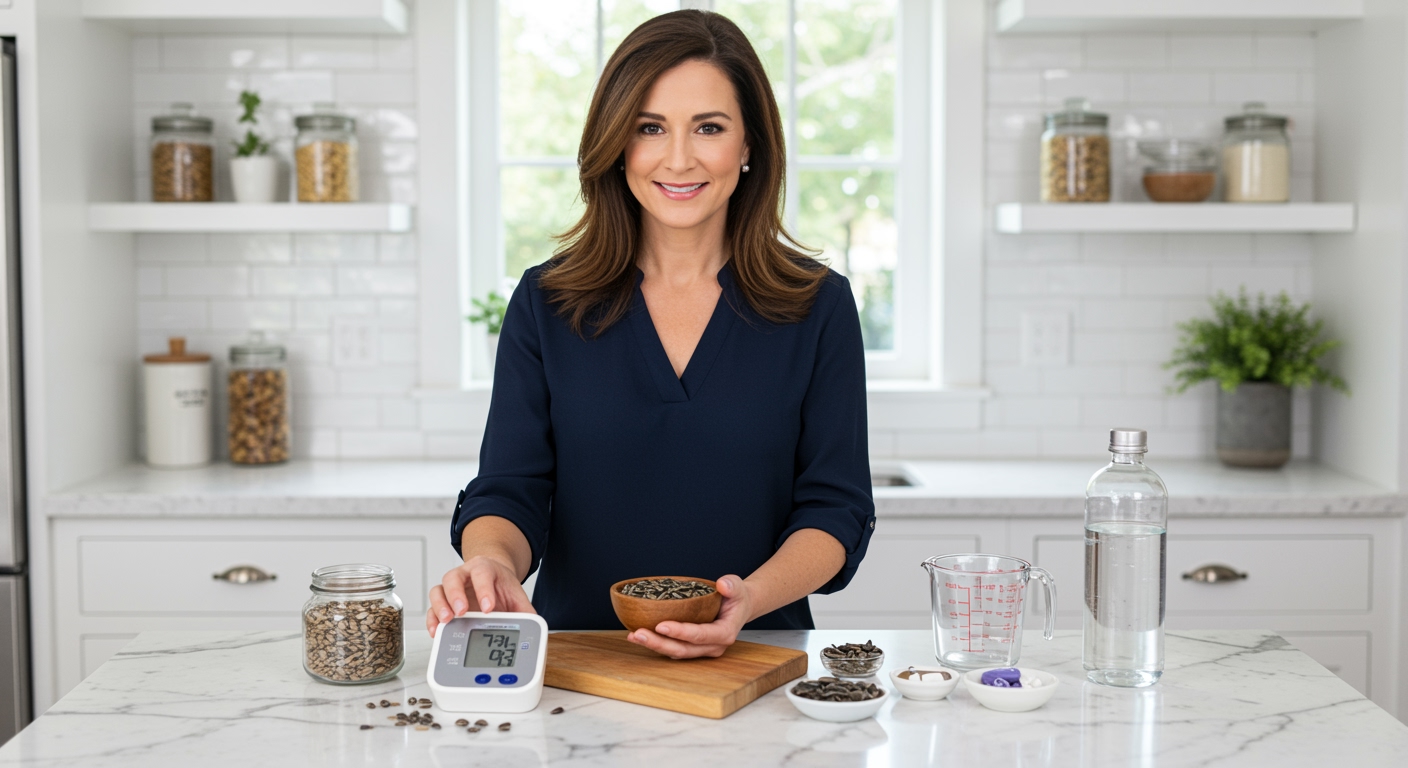✪ Key Takeaway: Sunflower seeds can help manage blood pressure through magnesium, potassium, and healthy fats that support cardiovascular health.
Introduction
Your doctor just told you that your blood pressure numbers are creeping up, and now you are wondering if there are natural ways to bring them down.
You might be asking this question because you want to avoid medication or simply add more heart-healthy foods to your diet.
Hi, I am Abdur, your nutrition coach, and today I am going to explain how sunflower seeds can be a powerful ally in managing your blood pressure naturally.
What Makes Sunflower Seeds Special for Blood Pressure?
Sunflower seeds pack an impressive nutritional punch that directly targets the mechanisms behind blood pressure regulation.
These tiny seeds contain three key nutrients that work together to support your cardiovascular system: magnesium, potassium, and healthy unsaturated fats.
Magnesium acts as a natural calcium channel blocker, helping your blood vessels relax and reducing the pressure against artery walls.
Just one ounce of sunflower seeds provides about 91 milligrams of magnesium, which is roughly 22% of your daily needs.
The potassium content helps balance sodium levels in your body, which is crucial for maintaining healthy blood pressure.
When sodium levels are high and potassium levels are low, your body retains more water, increasing blood volume and pressure on your arteries.
✪ Fact: One ounce of sunflower seeds contains more magnesium than a medium banana.
How Do The Healthy Fats in Sunflower Seeds Help?
The polyunsaturated and monounsaturated fats in sunflower seeds play a crucial role in cardiovascular health.
These healthy fats help reduce inflammation in your blood vessels, making them more flexible and responsive to changes in blood flow.
Research shows that replacing saturated fats with unsaturated fats can lead to significant improvements in blood pressure readings.
Sunflower seeds are particularly rich in linoleic acid, an omega-6 fatty acid that supports healthy cholesterol levels.
When your cholesterol profile improves, your arteries stay cleaner and more flexible, reducing the workload on your heart.
The vitamin E in sunflower seeds acts as a powerful antioxidant, protecting your blood vessels from oxidative damage that can lead to stiffening and increased pressure.
✪ Pro Tip: Choose unsalted sunflower seeds to avoid extra sodium that could counteract blood pressure benefits.
What Does Research Say About Sunflower Seeds and Blood Pressure?
Several studies have examined the relationship between seed consumption and cardiovascular health with promising results.
A study published in the American Journal of Clinical Nutrition found that people who regularly consumed seeds and nuts had lower systolic blood pressure compared to those who did not.
The magnesium content in sunflower seeds has been specifically studied for its blood pressure-lowering effects.
Research indicates that increasing magnesium intake by 100 milligrams per day can reduce systolic blood pressure by 5 mmHg and diastolic pressure by 2.8 mmHg.
The potassium in sunflower seeds works synergistically with magnesium to provide even greater cardiovascular benefits.
Studies show that adequate potassium intake can reduce the risk of stroke by 24% and heart disease by 25%.
✪ Note: These benefits are most pronounced when sunflower seeds are part of an overall healthy diet pattern.
How Much Should You Eat and When?
The optimal amount of sunflower seeds for blood pressure benefits is about one ounce per day, which equals roughly 1/4 cup.
This serving size provides substantial amounts of magnesium, potassium, and healthy fats without excessive calories.
You can eat them as a mid-morning or afternoon snack, sprinkle them on salads, or add them to your breakfast yogurt.
The timing is less important than consistency – regular daily consumption will provide the most cardiovascular benefits.
Always choose raw or dry-roasted varieties without added salt, sugar, or artificial flavors.
If you have existing kidney problems or take blood pressure medications, consult your healthcare provider before significantly increasing your potassium intake.
✪ Pro Tip: Store sunflower seeds in the refrigerator to prevent the healthy fats from going rancid.
Are There Any Risks or Side Effects?
Sunflower seeds are generally safe for most people, but there are a few considerations to keep in mind.
The calorie density is relatively high at about 165 calories per ounce, so portion control is important for weight management.
Some people may experience digestive discomfort if they suddenly increase their fiber intake from seeds without adequate water consumption.
Sunflower seed allergies are rare but can occur, especially in people with existing tree nut allergies.
The shells should never be eaten as they can cause digestive blockages and damage to your teeth and gums.
If you are taking blood pressure medications, monitor your levels closely as the combined effect might lower your pressure more than expected.
✪ Note: Always buy sunflower seeds from reputable sources to avoid contamination with harmful bacteria or mold.
The Bottom Line
Sunflower seeds can indeed help manage blood pressure through their rich content of magnesium, potassium, and heart-healthy fats.
Small seeds can create big changes when consumed consistently as part of a balanced approach to heart health.
I would love to hear about your experience with sunflower seeds or any questions you might have about incorporating them into your diet – please share your thoughts in the comments below.
References
At NutritionCrown, we use quality and credible sources to ensure our content is accurate and trustworthy. Below are the sources referenced in creating this article:
- Healthline: Sunflower Seeds: Nutrition, Health Benefits and How to Eat Them
- Harvard Health: Seed of the month: Sunflower
- Cleveland Clinic: Are Sunflower Seeds Good for You?
- PubMed: Magnesium intake and risk of type 2 diabetes





